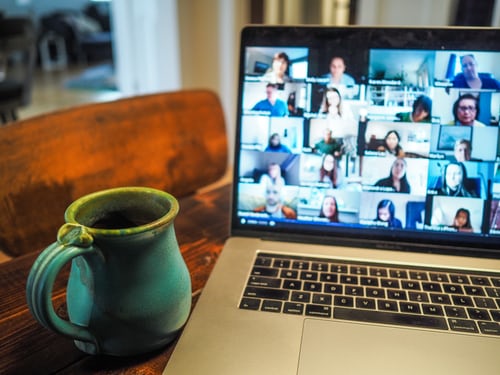A year after Covid-19, we are still left with a lot of unknowns. The virus still has an upper hand, and no one has been left unaffected by it. As well-known author and activist Arundhati Roy writes: "What is this thing that has happened to us? It's a virus, yes. In and of itself it holds no moral brief. But it is definitely more than a virus. Some believe it's God's way of bringing us to our senses… Whatever it is, coronavirus has made the mighty kneel and brought the world to a halt like nothing else could."[1]
Yes, it is the virus of uncertainty and fear that hit us last year around this time, changing our lives, perhaps forever. Living in isolation, we had a distorted sense of time as lockdowns were imposed in many parts of the world. I have heard many people say that we should just erase the past year from the diary of our life. We do not know if we will ever be able to go back to the "before [Covid-19] world." We are living the new normal, where all celebrations are held on Zoom or Skype. Instead of hugging our friends, we send lot of emoticons on the screen when we see them virtually. Back home in India, my father tells me that the prayers at the Sikh temples have moved to Zoom, with people sitting safely in their living rooms singing hymns and praying from the holy book. Many big temples are offering virtual "darshan" [glimpse] of the deities. In fact, most people have become so accustomed to this new normal that they feel nervous going back to their routine and meeting friends and neighbors even in small gatherings.
 Yuval Noah Harari, a historian, philosopher, and the bestselling author of Sapiens: A Brief History of Humankind, wrote that in 1918 humanity inhabited only the physical world, and when the deadly flu swept across the world, humanity had no place to run. Today many of us inhabit two worlds – physical and virtual. As the virus hit the physical world, people shifted much of their lives to the virtual world where the virus could not follow.[2]
Yuval Noah Harari, a historian, philosopher, and the bestselling author of Sapiens: A Brief History of Humankind, wrote that in 1918 humanity inhabited only the physical world, and when the deadly flu swept across the world, humanity had no place to run. Today many of us inhabit two worlds – physical and virtual. As the virus hit the physical world, people shifted much of their lives to the virtual world where the virus could not follow.[2]
My mother, who until last year was on the frequent flyer list of many airlines, has become equally comfortable sitting in her home office chair holding meetings across the world through Teams and Skype and making virtual connections. In fact, she panics at the thought of flying again. And my younger brother, who even insisted on going to school when he was sick as he did not want to miss playing with his friends, has happily adapted to "Fortnite" as his new companion, and is very excited to play with his friends in their virtual avatar.
And yet, I am scared to see this new normal and everyone around me getting so habituated to it. On one hand, bans on flights and less traffic on the roads contributed to lowering greenhouse gases in the past year. On the other hand, I worry about the disappearance of social interactions on which we humans once thrived. The US Center for Disease Control and Prevention recently issued interim guidelines for fully vaccinated people, which said: "Fully vaccinated people can visit with other fully vaccinated people indoors without wearing masks or physical distancing; they can visit with unvaccinated people from a single household who are at low risk for severe COVID-19 disease indoors without wearing masks or physical distancing." It may take years for the world population to get vaccinated against Covid-19. Until then, we will probably continue to ponder this question: "What is this thing that has happened to us?" And until then, my mother, sitting thousands of miles away, who earlier only worried if I was eating properly and having my vitamins, would continue to worry daily and ask me ten times if I was wearing a mask and sanitizing my hands!
"This storm will pass. But the choices we make now could change our lives for years to come," says Harari in another article.[3]
And what are the choices that we have made in the past year? Have the new normal made us any better, or we have just very comfortably learned to switch between "before" [Covid-19] and "after" [Covid-19] worlds as per our convenience. We continue to see increased nationalism, violence against minorities, and rising inequality. Black Lives Matter protests happened during the time of the pandemic, recently reports emerged of "systematic killings" carried out by Eritrean troops in the ancient Ethiopian city of Axum, while reports last year highlighted that over 10 million people were on the brink of catastrophic famine in the conflict-torn Yemen. The current crisis is not of the pandemic alone, but of entire humanity. The silver lining for me has been the spirit shown by various governments in sharing the Covid-19 vaccines with the less developed and poor nations and in many cases even giving them for free. We must remember that we are one if human race has to thrive.
[1] https://www.ft.com/content/10d8f5e8-74eb-11ea-95fe-fcd274e920ca
[2] https://www.ft.com/content/f1b30f2c-84aa-4595-84f2-7816796d6841
[3] https://www.ft.com/content/19d90308-6858-11ea-a3c9-1fe6fedcca75
